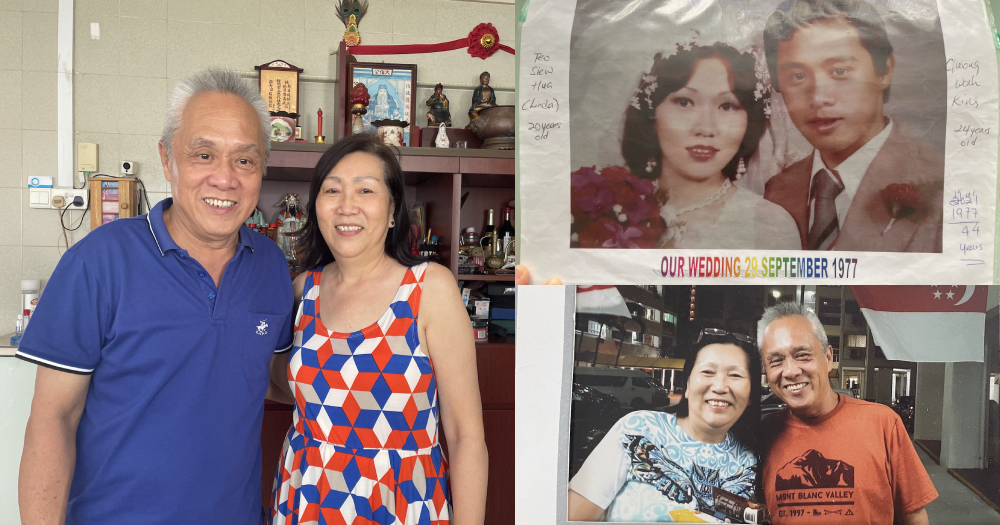Follow us on Telegram for the latest updates: https://t.me/mothershipsg
Prior to meeting my interviewees in-person, my knowledge of dementia was limited.
My experience with dementia mostly comprised faint childhood memories of my late grandfather, who developed a tendency to mistake me for my aunt.
Unaware that dementia can also manifest in other ways such as hallucinations and behavioural changes, my experience of meeting 68-year-old retiree Choong Wah King, who has early onset dementia, along with 64-year-old Lynda Teo Siew Hua, was truly eye-opening.
Teo is Choong's wife of 44 years, and now, his caregiver.
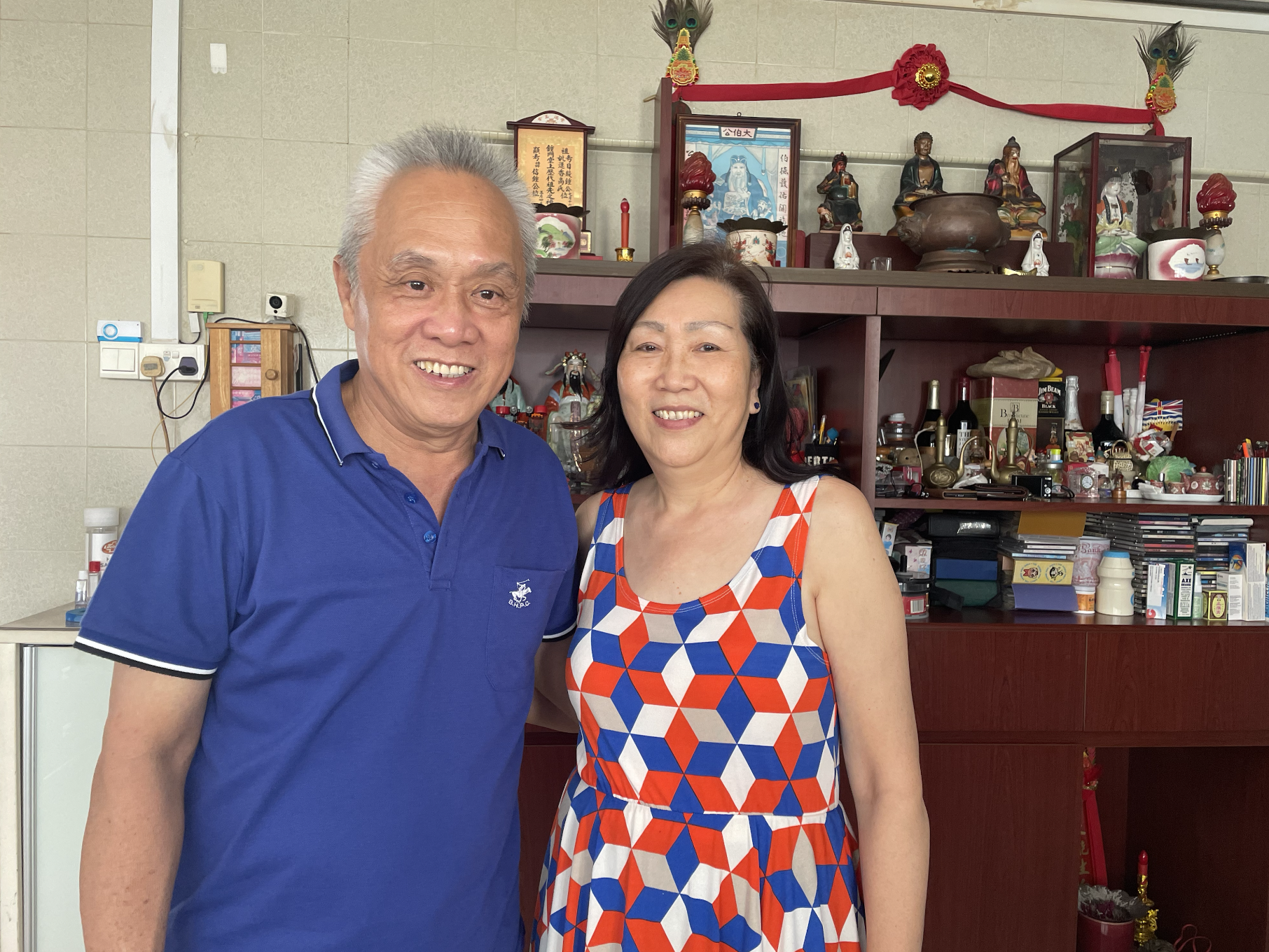 Choong Wah King and his wife Lynda Teo Siew Hua. Choong was diagnosed with vascular dementia in 2016. Photo by Karen Lui.
Choong Wah King and his wife Lynda Teo Siew Hua. Choong was diagnosed with vascular dementia in 2016. Photo by Karen Lui.
The questions I had prepared were mostly directed at Choong, in hopes of acquiring a glimpse of what living with dementia is like.
However, I soon realised that Choong's lucidness had deteriorated to the point whereby Teo had to answer most of the questions on his behalf.
Through Teo's retelling of Choong's story, I learnt about the uphill battle that a caregiver faces as she tries to slow down the dementia patient's deterioration while serving as the intermediary between him and his community.
Early onset dementia
According to a Straits Times report in July 2020, cases involving early onset dementia are on the rise.
In older patients, the condition typically manifests as memory disorders like forgetfulness.
Younger patients, on the other hand, usually demonstrate a range of symptoms which include behavioural changes, forgetfulness and difficulties with planning, sequencing and judgment.
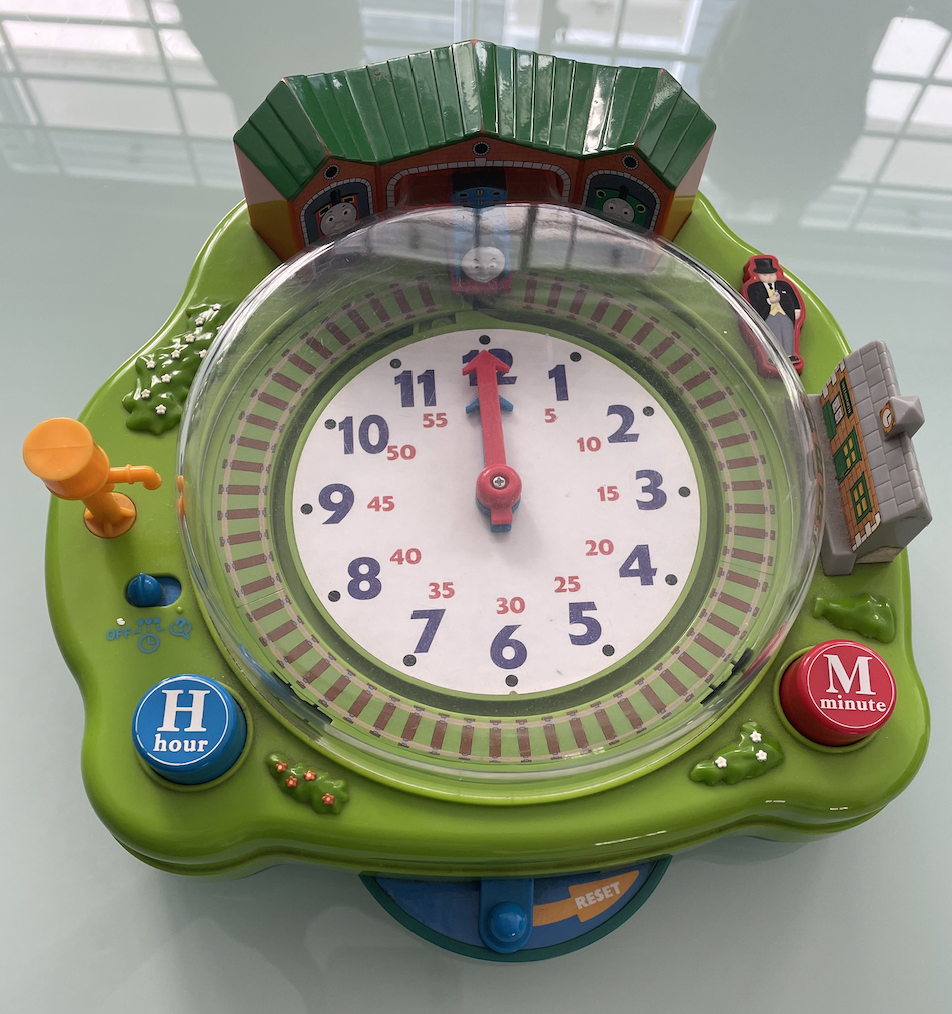 Teo repurposed a toy clock that used to belong to their grandchildren to remind Choong of how time works. Photo by Karen Lui
Teo repurposed a toy clock that used to belong to their grandchildren to remind Choong of how time works. Photo by Karen Lui
As of six months ago, Choong is in the "mild to moderate stage" but still deteriorating, said Teo.
 A children's sticker book that Choong does in his free time to maintain his hand-eye coordination. Photo by Karen Lui
A children's sticker book that Choong does in his free time to maintain his hand-eye coordination. Photo by Karen Lui
While her husband was officially diagnosed with early onset dementia in 2016 at the age of 63, Teo believes that he was already affected by it much earlier.
Started behaving erratically in 2010
Choong's behavioural changes started in 2010.
He became increasingly suspicious, accusing his wife of keeping a boyfriend outside, and claiming that his mother-in-law was a spy, even locking her out of the house once.
Choong's erratic actions resulted in tense familial relations, requiring intervention from a counsellor at one point, said Teo.
"A lot of things happened everyday. He would call me, she would call me. My mother said, 'He wants to beat me'. [It felt like] living in hell almost everyday."
On the advice of a friend, Teo brought Choong to a polyclinic, which subsequently referred the couple to the National Neuroscience Institute (NNI) for an MRI.
The results from the scan were sobering: Choong was suffering from "shrinkage of the brain"; the then-63-year-old was diagnosed with vascular dementia.
Vascular dementia, like all other forms of dementia, has no cure.
Possibly caused by a silent stroke in 2010
Like Alzheimer’s disease, vascular dementia is a common type of dementia. Also known as post-stroke dementia, the condition is commonly caused by strokes in the brain, which impair blood flow and cause decline in brain function.
Choong did not have a history of stroke — or rather, none that he and Teo were aware of. Their doctor, however, believed that he might have had a silent stroke years before.
Sometime in 2010, Choong woke up in the middle of the night complaining of "a very, very bad headache". Not knowing what else to do at the late hour, Teo gave her husband two Panadol tablets.
The next morning, she asked him how he felt after the terrible headache, but he simply assured her, “I’m fine now.”
Teo believes that if Choong had gone for an MRI in 2010, they might have been able to nip it in the bud.
Unfortunately, by the time he went for the scan years later, "it was too late after so many years and behavioural changes".
"I would like to share or highlight to people — if there’s... abnormal kind of pain, headache, you need to be alerted, go and see a doctor quickly, do MRI or whatever. That’s very important."
Hallucinations, verbal lashings & suicidal thoughts
Teo confessed that she did not really know what dementia was initially when she first learnt of Choong's condition.
Loss of memory is what most people associate with dementia, but the behavioural symptoms — the mood swings and changes in personality — demonstrate the true extent of how the disease puts a strain on relationships.
Scolded and cursed at his wife for two hours
The drastic change in Choong's behaviour really affected his wife.
"He didn’t scold me last time but when his behaviour changed, he did that to me, so I couldn’t take it at that point in time."
The triggers for his bad mood tend to revolve around "hallucinations and delusions", which cause him to accuse people around him of things that they did not do.
"He always thinks that a lot of people come into my house to paint and maybe [work on] some kind of utilities."
These thoughts often send Choong into a state of agitation common in patients with dementia, resulting in verbal lashings that he unwittingly unleashes on his wife and helper.
Once, he cursed and scolded Teo in front of other patients at a polyclinic for two whole hours.
"I was so sad, but I had to control myself [from breaking down]. I did not know what to do so I just kept quiet. The moment I stepped into the consultation room, I broke down and cried.
"That was the worst episode," said Teo, as tears welled up in her eyes.
Husband feels that he is a burden
Choong has occasional moments of lucidness, which can offer snatches of relief, but also acute sorrow, said Teo, choking up as she recounted how her husband would express suicidal thoughts:
"He said that he wanted to die because he feels that he’s a burden to me."
It's a painful thing for one to hear, devastating even, if not for the fact that Choong does not have the courage to take his own life. This much he admitted to her.
"Luckily he said that, otherwise I don’t know what will happen," she said, chuckling weakly.
Slowly losing memories of family
People with dementia struggle to recall things they have done, and Choong is no exception.
Sometimes, he would insist that he had not eaten lunch, even though he had. So Teo started taking pictures of him eating, as evidence in case he forgets.
It doesn't always work, though.
Sometimes, when he is deep in the throes of his delusion, Choong would insist that the person in the picture is not him, and accuse his wife of lying.
Still, such incidents are relatively minor when compared to Teo's fear that her husband will eventually forget her.
"He's beginning to forget who am I," she said, as she tried to stifle tears.
"Sometimes, I work at home and I'd be at my laptop, and he would be talking and doing activities with my helper. He would ask her, 'Where’s my wife?'.
And I would reply, 'Eh hello, I’m here!'
'Huh? You ah? You are my wife?' . . . . He can only remember our wedding photograph when I was 20 years old and he was 24 years old."
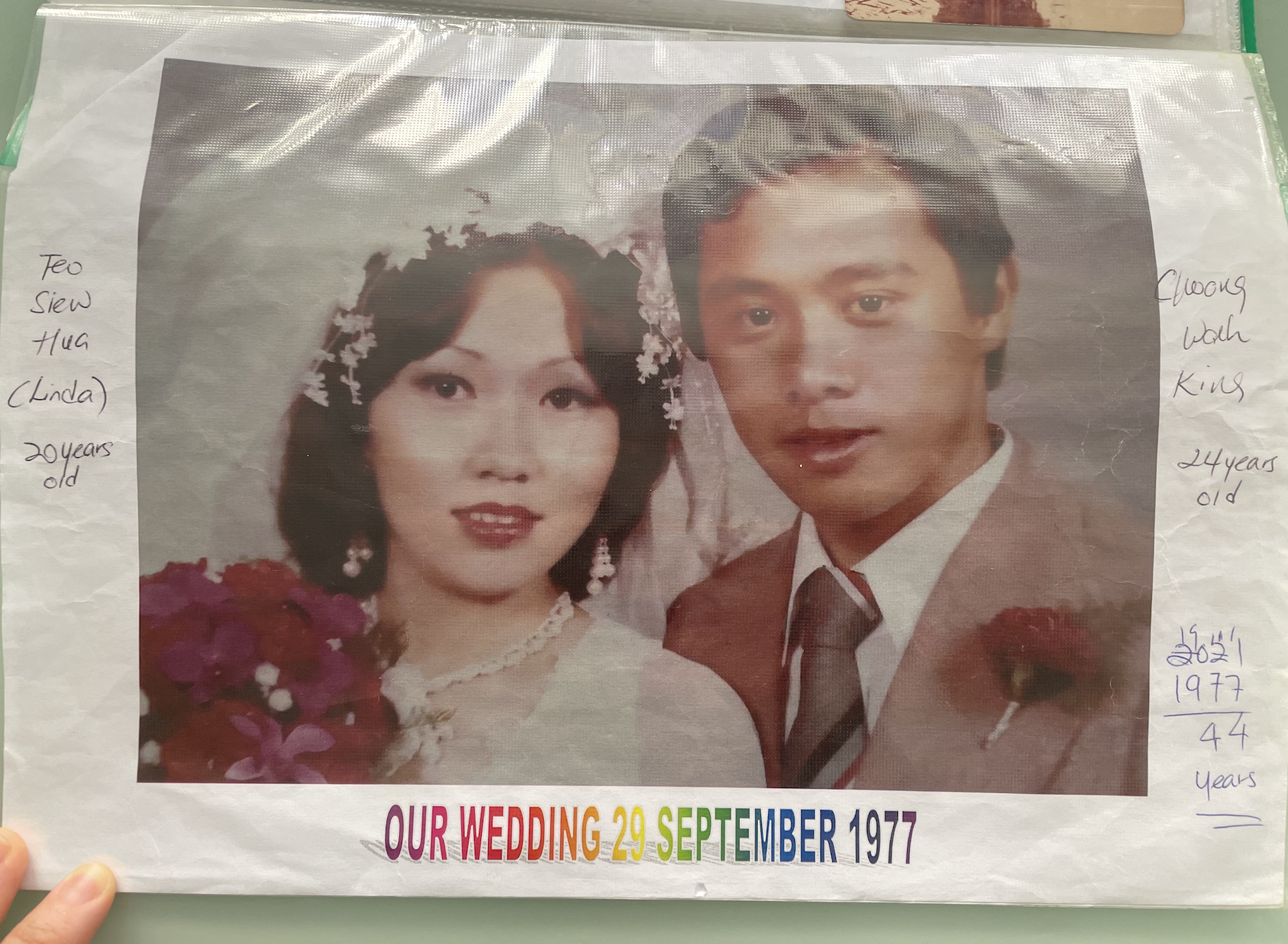 The couple's wedding photo, with the wedding date and details such as their full name and age added by Teo. Photo by Karen Lui.
The couple's wedding photo, with the wedding date and details such as their full name and age added by Teo. Photo by Karen Lui.
It isn't just his wife that Choong is starting to forget.
As our conversation shifted to the topic of his family, Teo gently prodded him to recall the names of his grandsons. It took a while — and a good deal of coaxing and encouragement — but he managed to give the right answers: Wen Kang and Xun Kang.
And then, just like a key turning in a lock, Choong broke out in a wide smile as he recalled the fond times he shared with his grandsons — "They always come to my house, like to talk to me, play with me, like this," he said.
Choong soon lapsed back into his dementia-induced habit of lamenting about spending his days sleeping at home while his wife works.
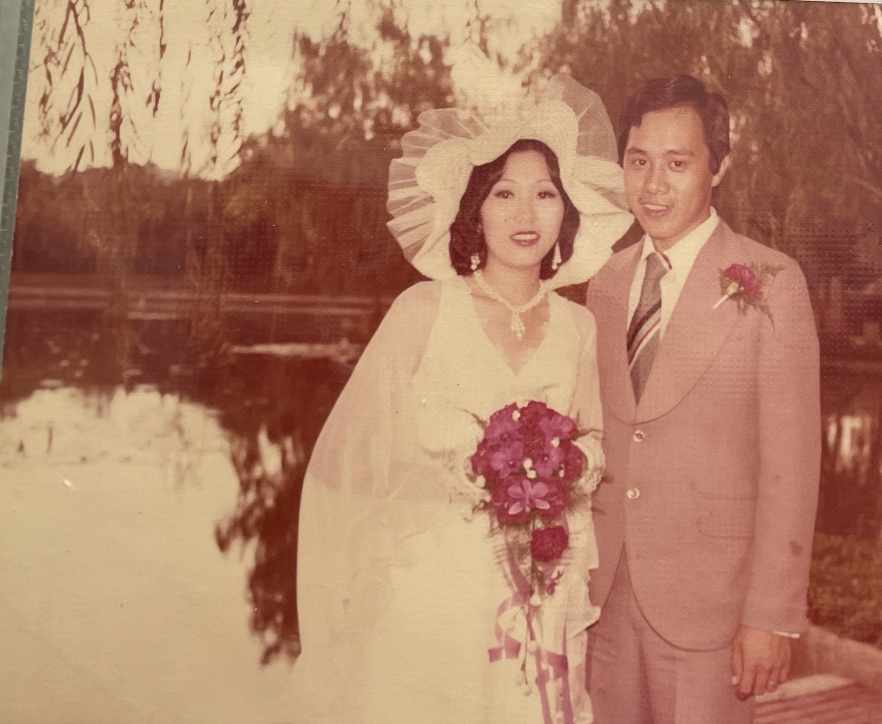 Another picture taken during their wedding included in a clear file which Teo uses to jog Choong's memory. Photo by Karen Lui.
Another picture taken during their wedding included in a clear file which Teo uses to jog Choong's memory. Photo by Karen Lui.
Living and coping with dementia
Five years since Choong's diagnosis, it seems like Teo has a better handle on being Choong's caregiver.
She meticulously documents everything — from mealtimes to visits — with photos so that her husband will have reminders in the likely event that he forgets.
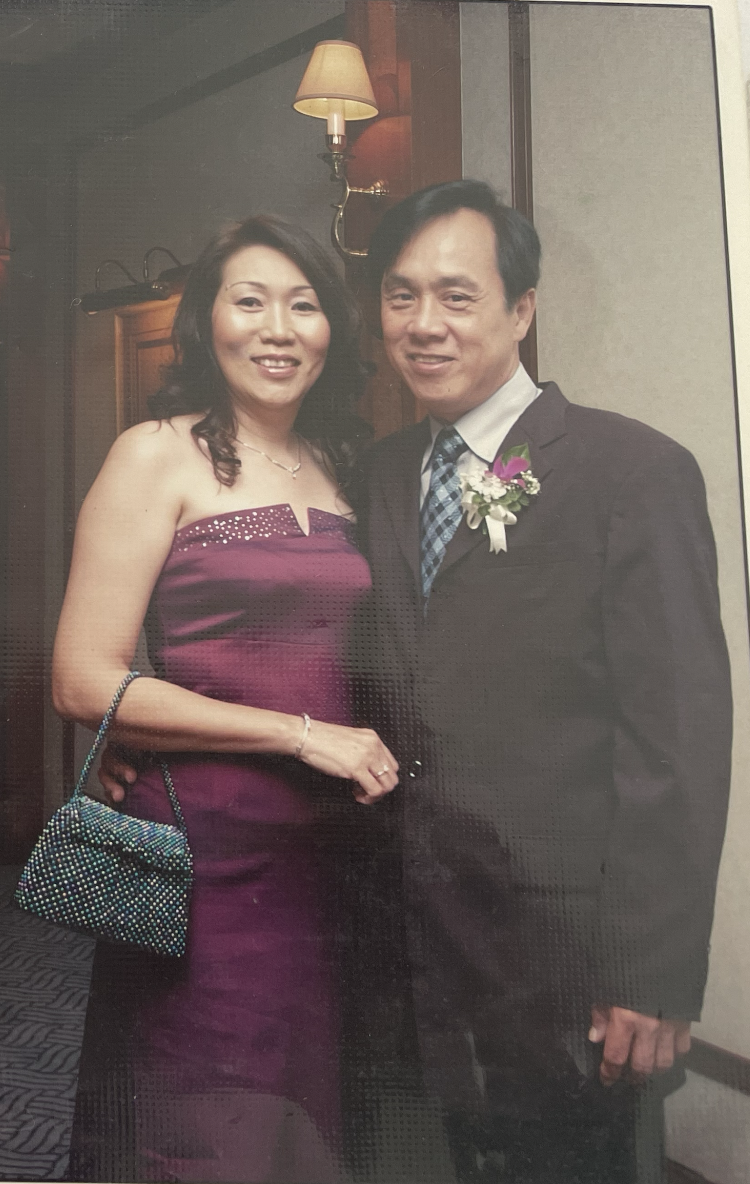 A more recent picture taken at one of their daughters' wedding that is also stored in the clear file. Photo by Karen Lui.
A more recent picture taken at one of their daughters' wedding that is also stored in the clear file. Photo by Karen Lui.
The couple have even travelled overseas together, which Teo finds is "still okay", despite some minor inconveniences.
At home, Teo makes sure that all the house keys are locked away before heading to bed, in case her husband tries to leave in the middle of the night.
But because most hotel room doors can be opened from the inside, a person with dementia can sneak out easily without the knowledge of the caregiver.
To address this, Teo purchased a battery-operated door chime with a sensor and placed it in an area where Choong would need to pass in order to reach the door.
The chime sounds when the sensor is triggered, alerting Teo to act immediately.
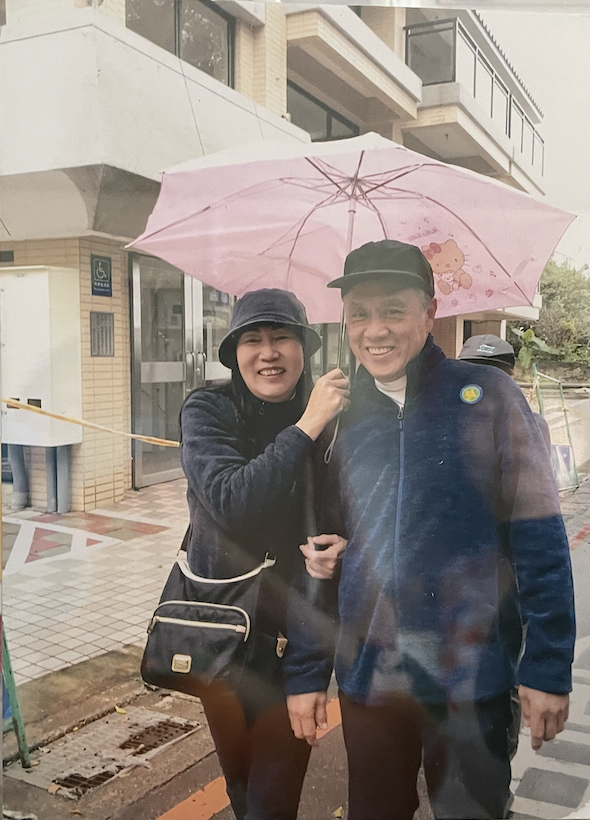 A photo of the couple on an overseas trip displayed in their living room. Photo by Karen Lui
A photo of the couple on an overseas trip displayed in their living room. Photo by Karen Lui
Creative ways to slow down Choong's deterioration
Although there is no cure for dementia, Teo is doing her best to slow down her husband's deterioration and help him cope with the disease.
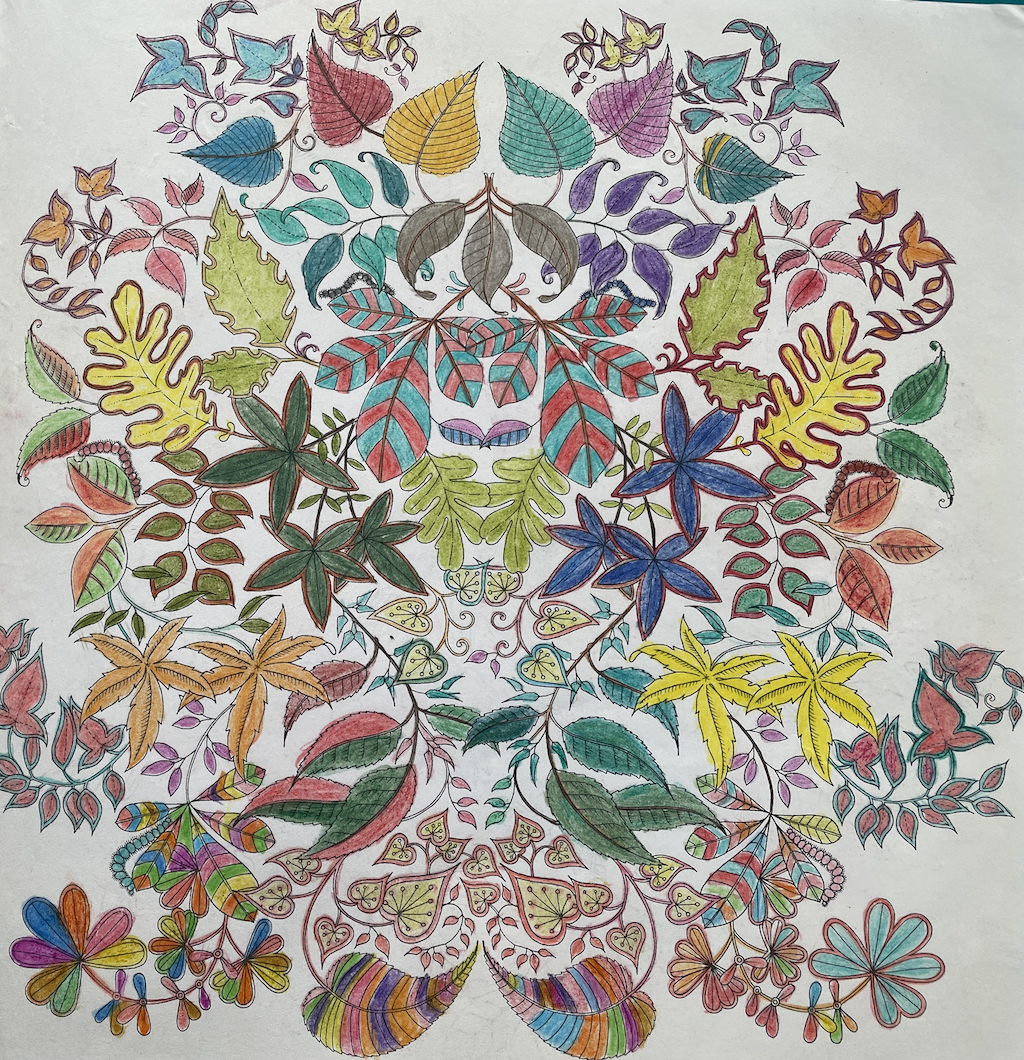 Colouring done by Choong. Photo by Karen Lui
Colouring done by Choong. Photo by Karen Lui
Hobbies that Choong has picked up since his diagnosis include colouring, puzzles, and simple mathematical exercises with their helper.
Such activities help to keep Choong calm, and ease his agitation.
 Colouring done by Choong. Photo by Karen Lui
Colouring done by Choong. Photo by Karen Lui
"He finished two [colouring] books, this is the third one," Teo shared, hinting at his enjoyment of the therapeutic activity.
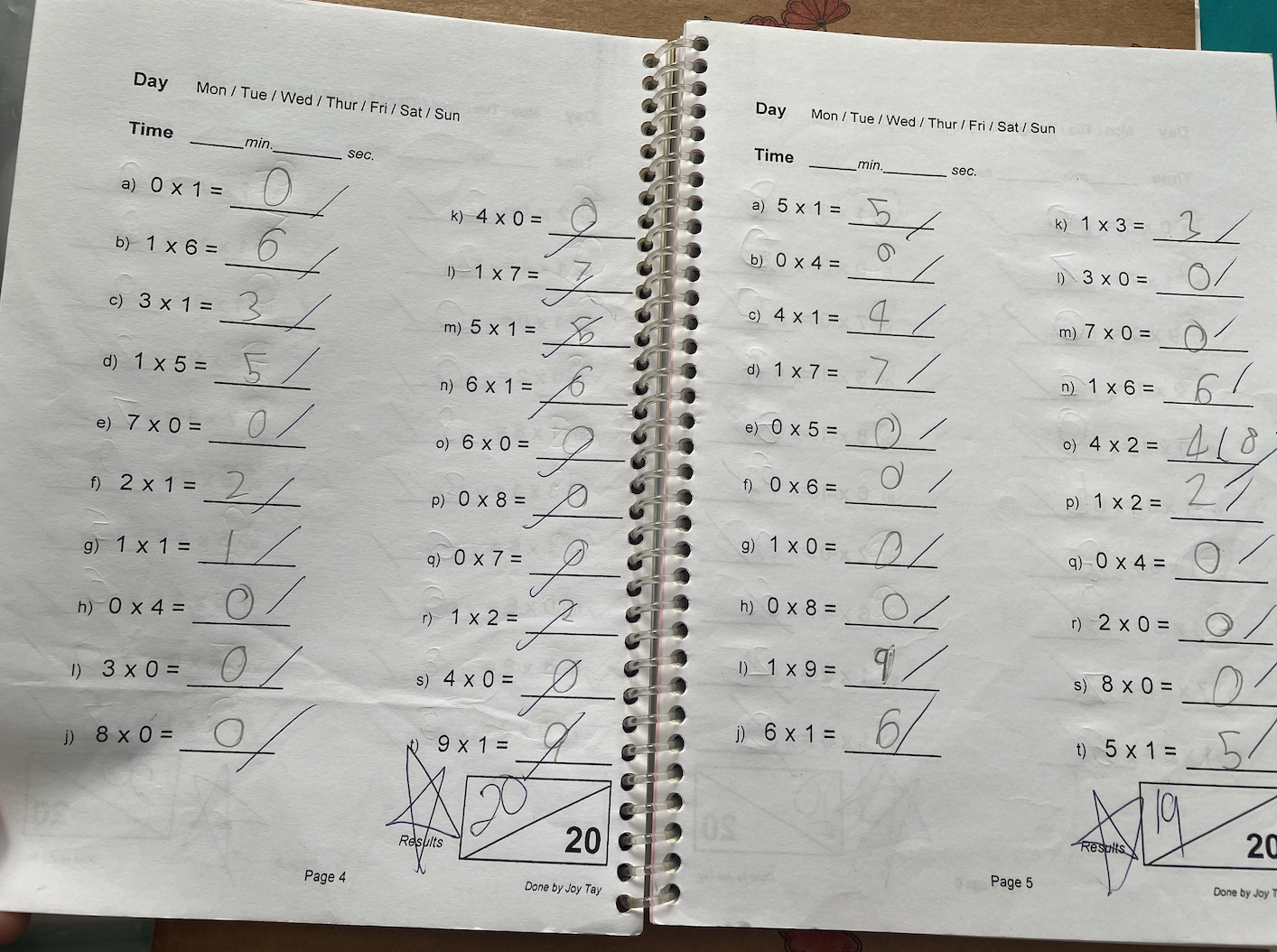 Mathematics exercise books that their helper goes through with Choong to slow the deterioration of his condition. Photo by Karen Lui
Mathematics exercise books that their helper goes through with Choong to slow the deterioration of his condition. Photo by Karen Lui
Persisting glimpses of normality
Despite Choong's behavioural changes and memory loss, he still retains some of his old qualities, which Teo is grateful for.
For instance, Choong is "patient and very detailed" when it comes to his colouring.
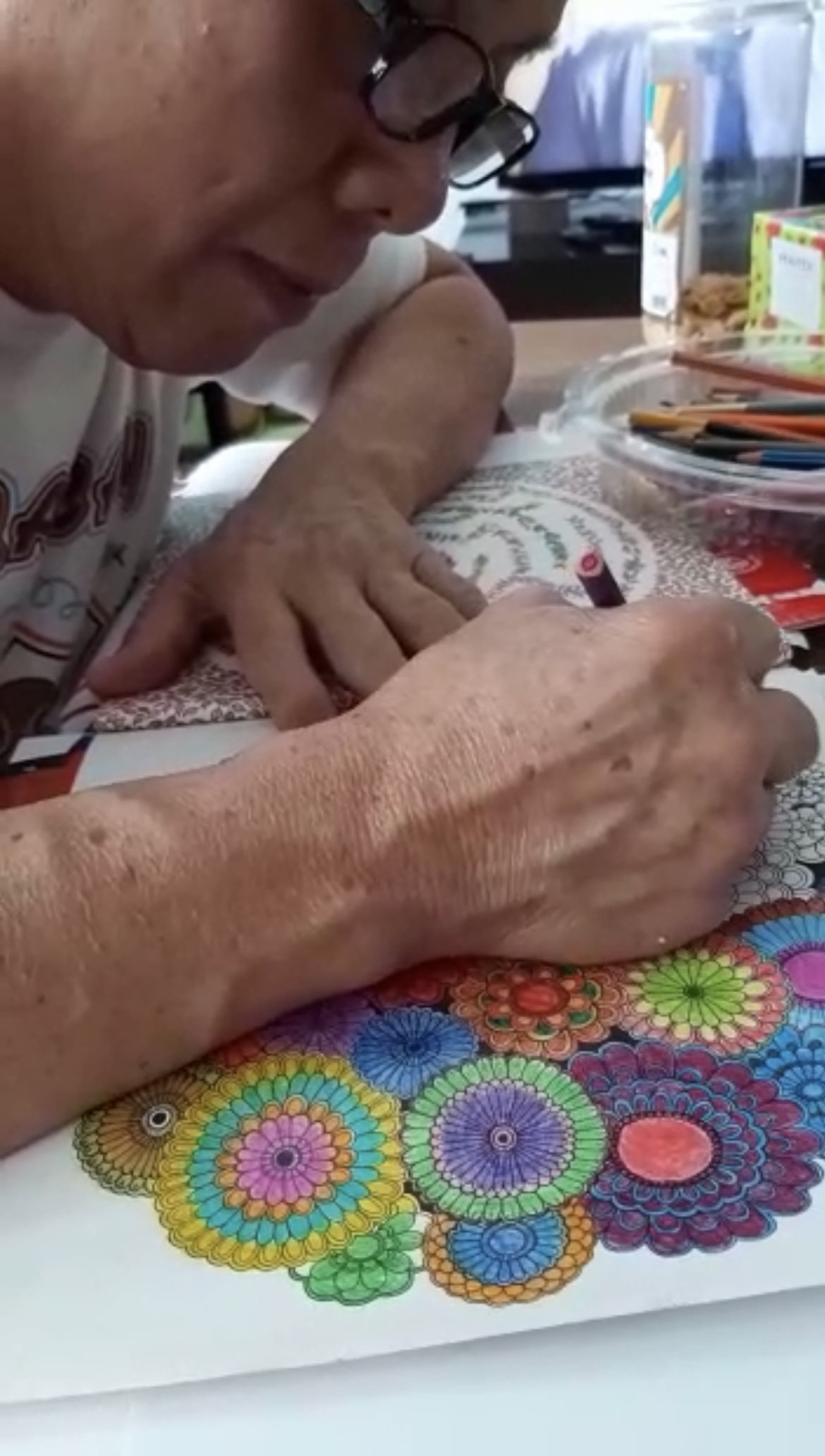 Choong doing some colouring. Screenshot via video by Teo.
Choong doing some colouring. Screenshot via video by Teo.
Choong's detail-orientedness dates back to his younger days; "whatever he wanted to do, he'll do it nicely", Teo said. "That's why I think he still has it."
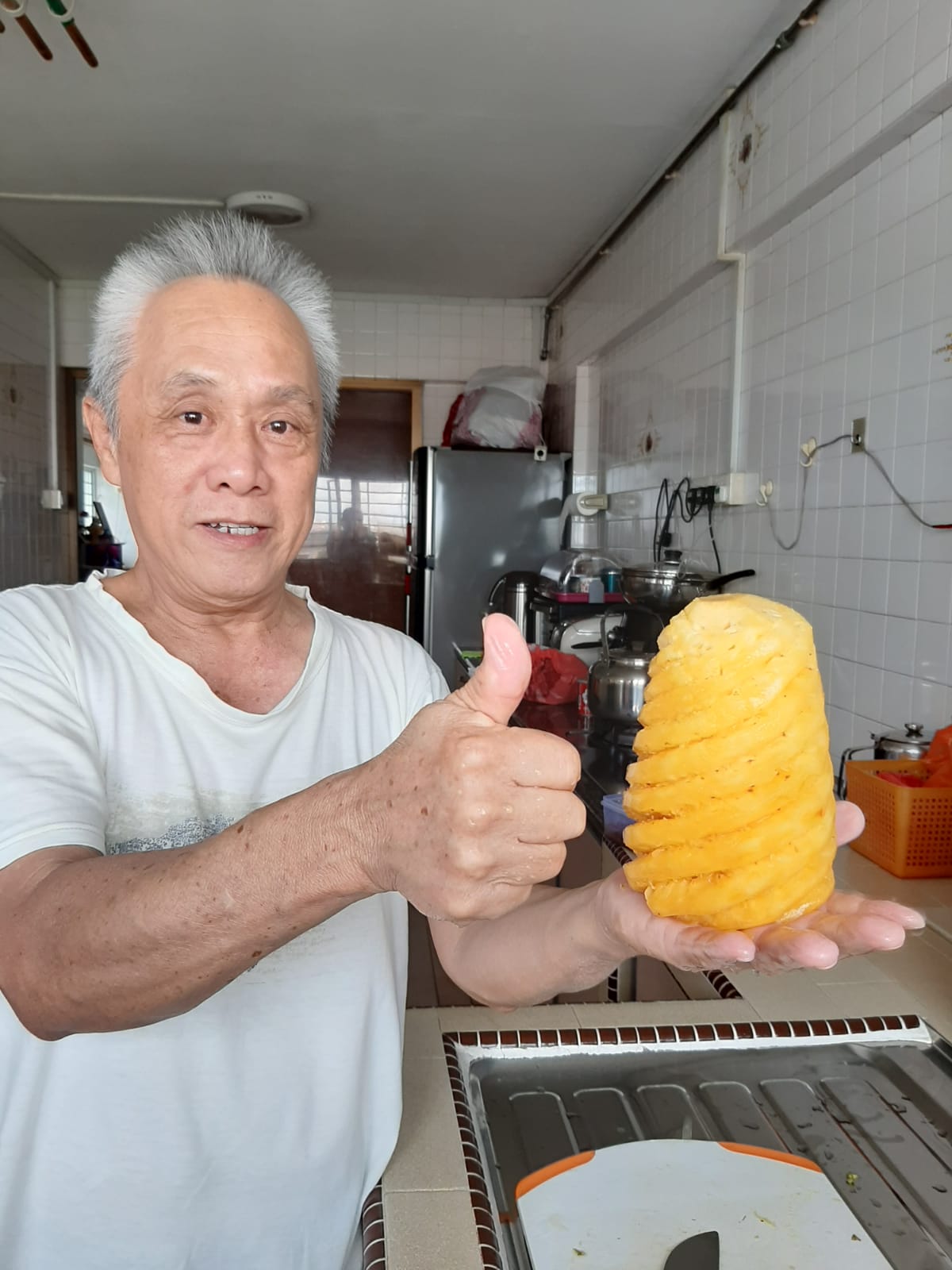 Choong showing a pineapple he helped to cut. Photo by Lynda Teo.
Choong showing a pineapple he helped to cut. Photo by Lynda Teo.
In the past, she depended on Choong as her trusty handyman who would tend to issues in the flat such as plumbing and lighting.
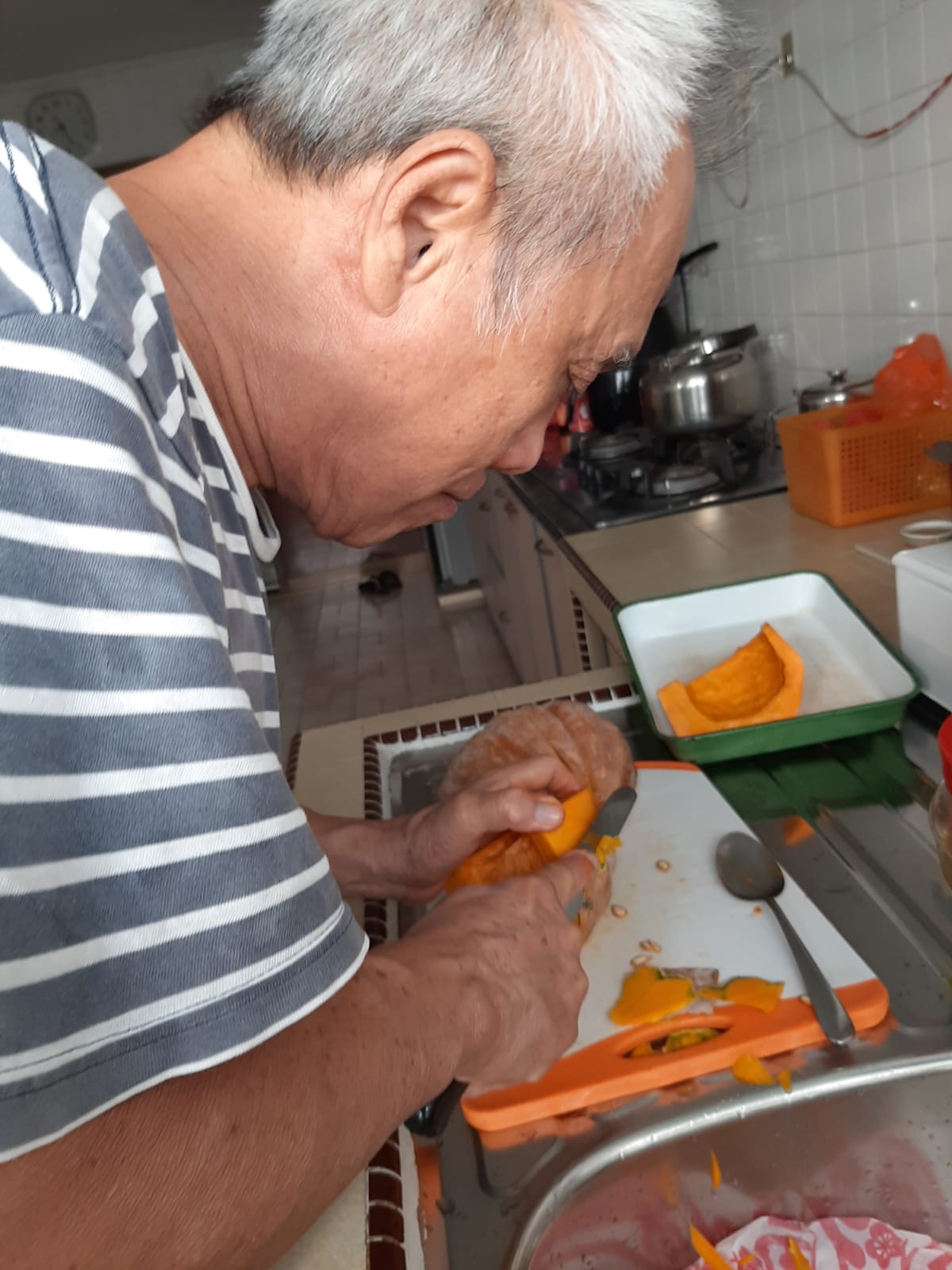 Choong is able to still help Teo with simple chores like cutting fruits. Photo by Lynda Teo.
Choong is able to still help Teo with simple chores like cutting fruits. Photo by Lynda Teo.
Choong "still can do it" sometimes, Teo said, gesturing to an old fan in the corner of the flat.
"I thought the fan didn't work anymore and thought of throwing it away and getting a new one," Teo recalled
Instead of throwing it away, she figured she'd let Choong experiment.
Her husband took one look at the fan, identified the faulty component as a broken wire, and subsequently patched it up.
"Then it works! So clever!" she shared excitedly.
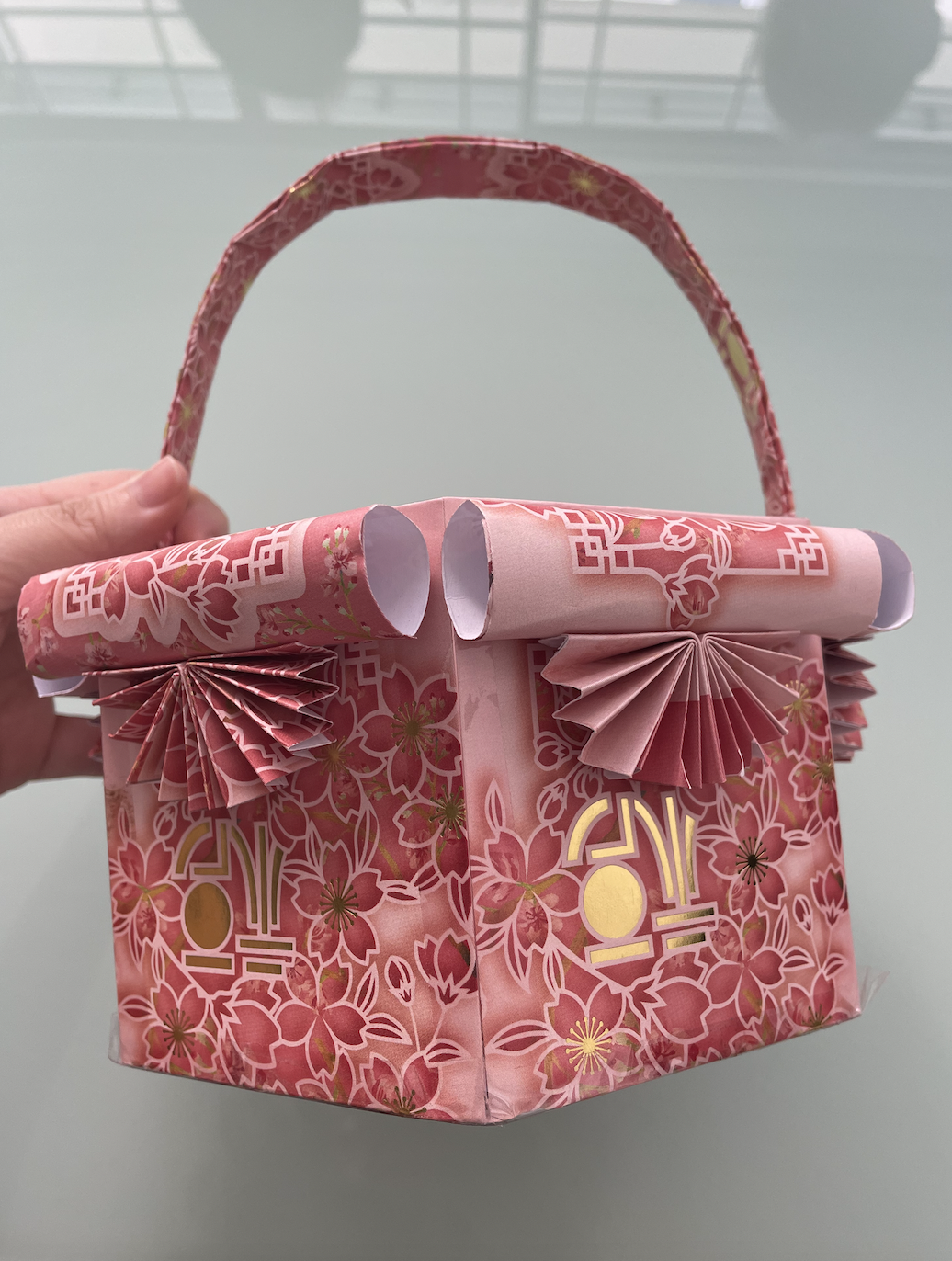 An ang bao basket that Choong made for Chinese New Year. Photo by Karen Lui
An ang bao basket that Choong made for Chinese New Year. Photo by Karen Lui
It's evident that Teo takes comfort and pride in Choong's ability to do the smallest things, from making ang bao baskets to cutting fruits and assisting in the kitchen.
"He can still do certain things. That's why if he can do [it], I just let him try. Why not enable and empower him to do things?"
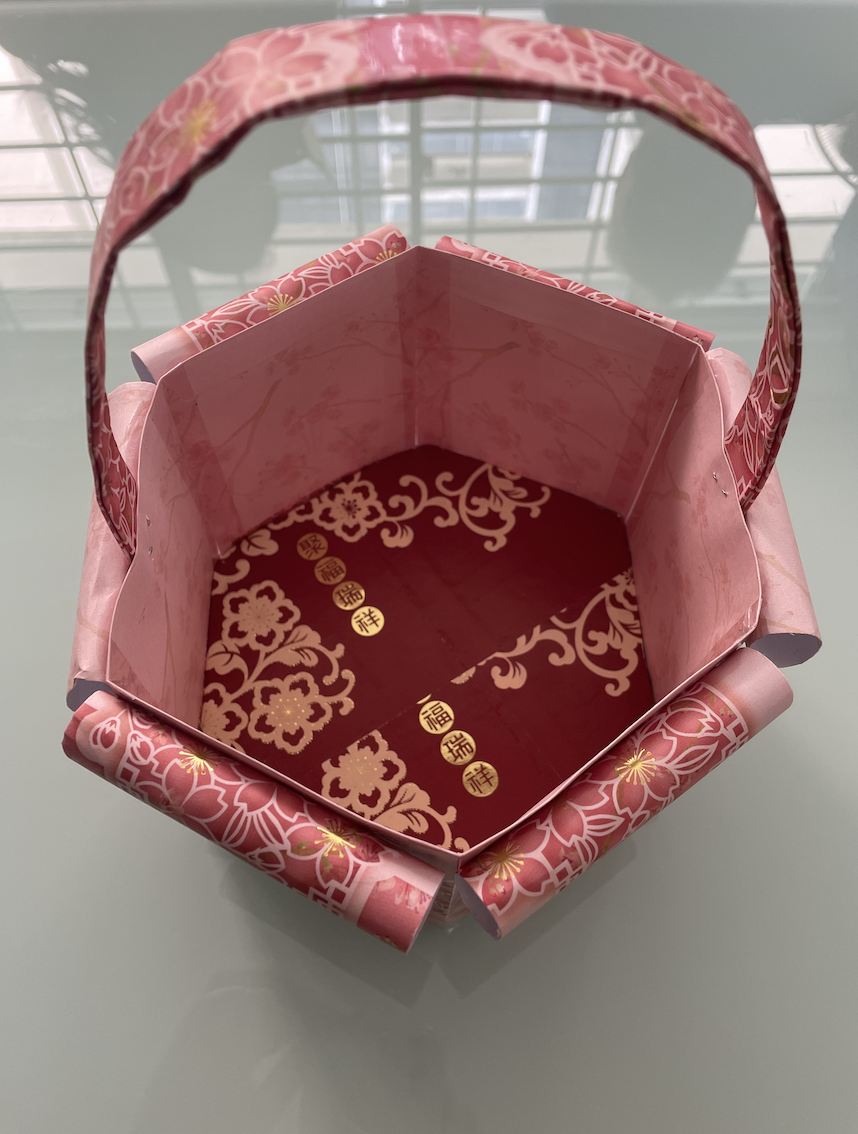 Photo by Karen Lui.
Photo by Karen Lui.
Meeting and growing with other people with dementia
Caring for someone with dementia takes a village, and Teo has been receiving support from the Alzheimer's Disease Association (ADA) in Singapore.
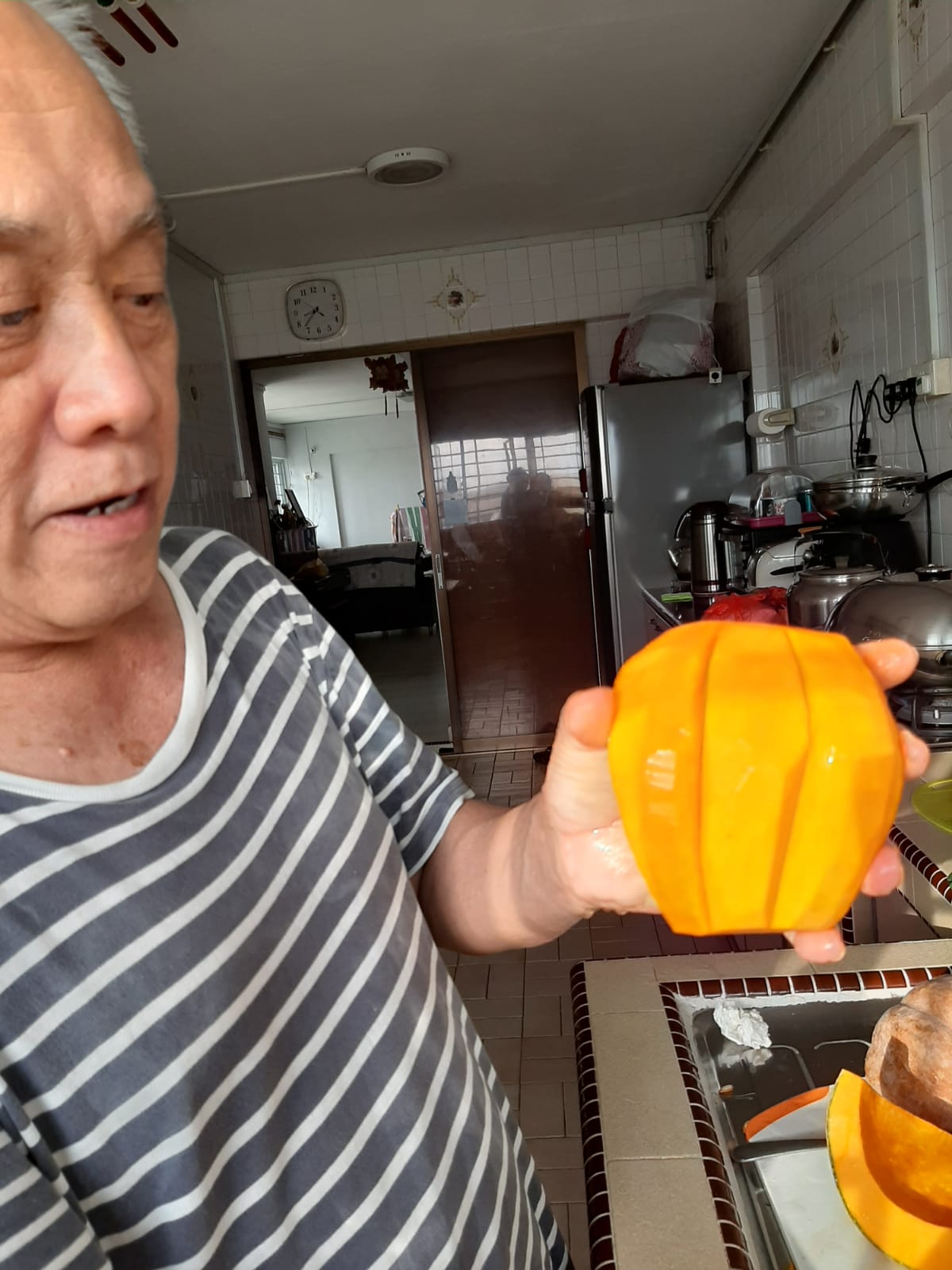 Choong showing the pumpkin he helped Teo to cut. Photo by Lynda Teo.
Choong showing the pumpkin he helped Teo to cut. Photo by Lynda Teo.
Teo arranged for a social worker from ADA's ElderSit programme to come engage Choong in activities once a week.
The couple subsequently joined other ADA programmes like the Memories Cafe (where persons with dementia and their caregivers can meet and interact in a safe setting outside their homes), and the Voices for Hope programme, which enables persons with dementia to be confident and share their stories, needs, and views on public platforms.
"Voices for Hope teaches us advocacy so we try our best to go down if we are invited to do advocacy," Teo said.
"I know a lot of people think dementia is for older people but early onset dementia is on the rise so we would like to share about this."
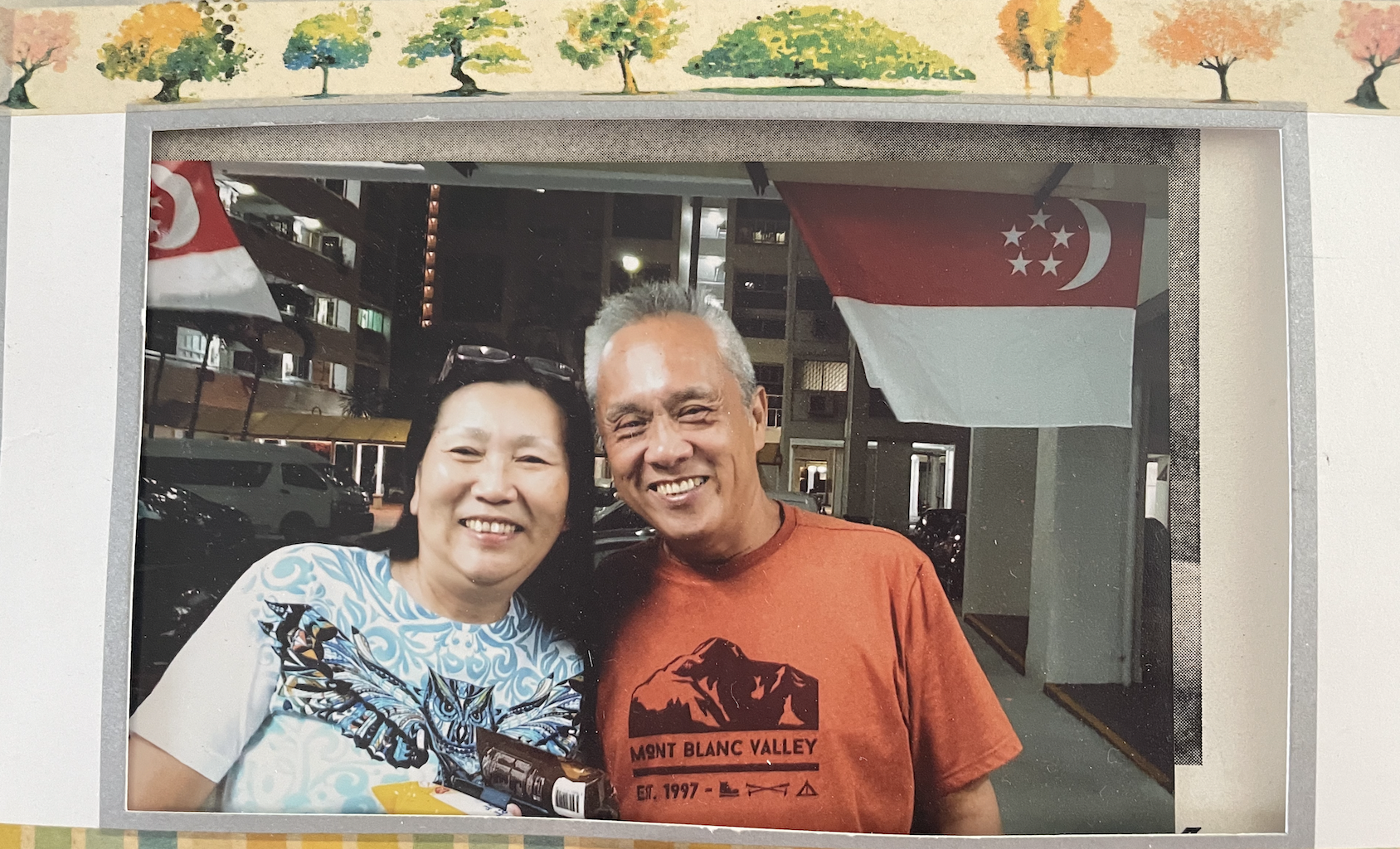 A photo of the couple at their void deck, displayed in their living room. Photo by Karen Lui.
A photo of the couple at their void deck, displayed in their living room. Photo by Karen Lui.
As one's dementia progresses over time, the journey for both them and their caregiver becomes increasingly taxing on mind and emotions.
But the ever-resolute Teo is determined to walk with her husband every step of the way:
"What I learnt, I know from him is that he is afraid of losing the loved one, he’s afraid that I would leave him. So, sometimes I assure him that I will go along with him on the journey."
A lady with dementia tells us what it's like to slowly lose one's sense of self
If you would like to donate to the Alzheimer's Disease Association, you may do so here.
Stories from the City of Good is a series on ordinary Singaporeans giving their best for others and inspiring each other to become a Singapore that cares. This is a collaboration between Mothership and the National Volunteer and Philanthropy Centre.

Top images by Karen Lui
If you like what you read, follow us on Facebook, Instagram, Twitter and Telegram to get the latest updates.
